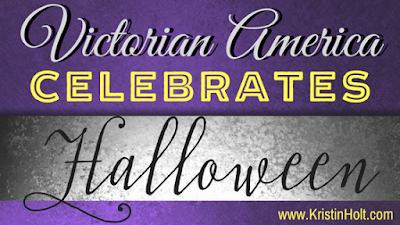by
USA Today Bestselling Author Kristin Holt
Happy
Halloween! If you're a lifelong resident of the United States, you've probably
already bought candy for trick-or-treaters. Did you know Americans are anticipated to spend $3.8 billion on candy. BTW: Trick-or-Treating, and candy, are a 20th century development.
But Halloween's been around for ages.
Halloween--All
Hallows Eve, All Saints Day, Hallowe'en, the witching eve--has been acknowledged and celebrated for centuries.
Like most things, traditions followed immigrants from Europe, where paganism
melded with Christianity. That's Old World
history... I'm mostly concerned about the Victorians. All of my titles, thus far, are American Historical
Romances.
See my post about Victorians Celebrating Halloween!
Nineteenth-century Americans had a good
time with Halloween. Vintage sources (newspapers and books) show that
"boys will be boys" (in quotation marks because the term was new to American English)--and they loved their pranks!
 |
| Muskogee Phoenix of Muskogee, Oklahoma / Indian Territory on November 3, 1892. |
| The Summit County Beacon of Akron, Ohio on November 7, 1887. |
Halloween was a great excuse to prank anyone and everyone:
"It
is the season, when, under the cover of darkness, tricks are played on
unsuspecting humanity, some of these tricks being of such an extremely
practical nature as to cease to be a joke." ~ Pittsburgh Daily Commercial of Pittsburgh, Pennsylvania on October 31, 1873.
Victorian
Americans also celebrated the holiday with parties. Nineteenth-century
Americans looked for any excuse to break the monotony of long winters and
social isolation (especially on the frontier) with as many social events as
possible. After all, how else would a bachelor find a suitable lady to court?
Parties
were held in young ladies' homes, where they invited their female friends
("a dove party")... but the boys did everything they could to crash
the party.
 |
| Springfield Daily Republic of Springfield, Ohio on November 5, 1887. |
Some
social events were put on by clubs or churches. Some were supper parties...
 | |
| The Wichita Daily Eagle of Wichita, Kansas on October 30, 1890. |
... Others were all about games.
Ladies'
party games were hand-me-downs from old European traditions:
"To
walk down cellar [stairs] or around the house backward, holding a lookingglass [sic], at
midnight, will insure a view in the glass of one's future partner in marriage.
Stir a little salt in the yolk of an egg, and eat it before retiring, or say
the Lord's prayer backward, and prophetic visions will come in dreams." ~ The Emporia Weekly News of Emporia,
Kansas on November 6, 1874.
Coming Around the Corner ~
Surprise!
Right
away (before Halloween), I'll have a "spooky" Sweet Romance Short
Story set in the Victorian American West, amid my Holidays in Mountain Home Series. This story will be FREE (my gift!) to my newsletter subscribers. Don't
delay! Sign up right away to receive my
newsletter notice of this free read.
[Every newsletter has an
easy-to-unsubscribe link, opportunity to enter a drawing (every single month)
for valuable prizes, only important news, and guaranteed safeguarding of your
private information.]
Speaking
of Newsletters ~ Our Sweet Romance Reads Newsletter is the bomb! Ripe with
extras, freebies, up-to-date information about your favorite Sweet Romance
Authors, this once-per-quarter newsletter is a favorite!
See Related Blog Posts:
Copyright © 2017 Kristin Holt LC














So fun to read about all these Halloween traditions, Kristin. And All Soul's Day is November 2nd.
ReplyDeleteThanks, Josie. =) Forgive my lapse... is All Soul's Day uniquely different (at least in our day) from All Hallow's Eve (day before)? I see I should've double-checked my historic finds. In many newspapers of the era (last half of the 19th century), all four names were used almost interchangeably.
ReplyDeleteI'd honestly appreciate your feedback, Josie.
Does anyone else know details that would help me separate the terms used in this article? [Hallowe'en (contraction of Hallow and evening), All Hallow's Eve, All Saints Day, and the witching eve]
Thank you!
Kristin
Interesting stuff. Thanks for sharing.
ReplyDeleteThanks, Gina. So glad you enjoyed it. Thanks for stopping by.
Delete